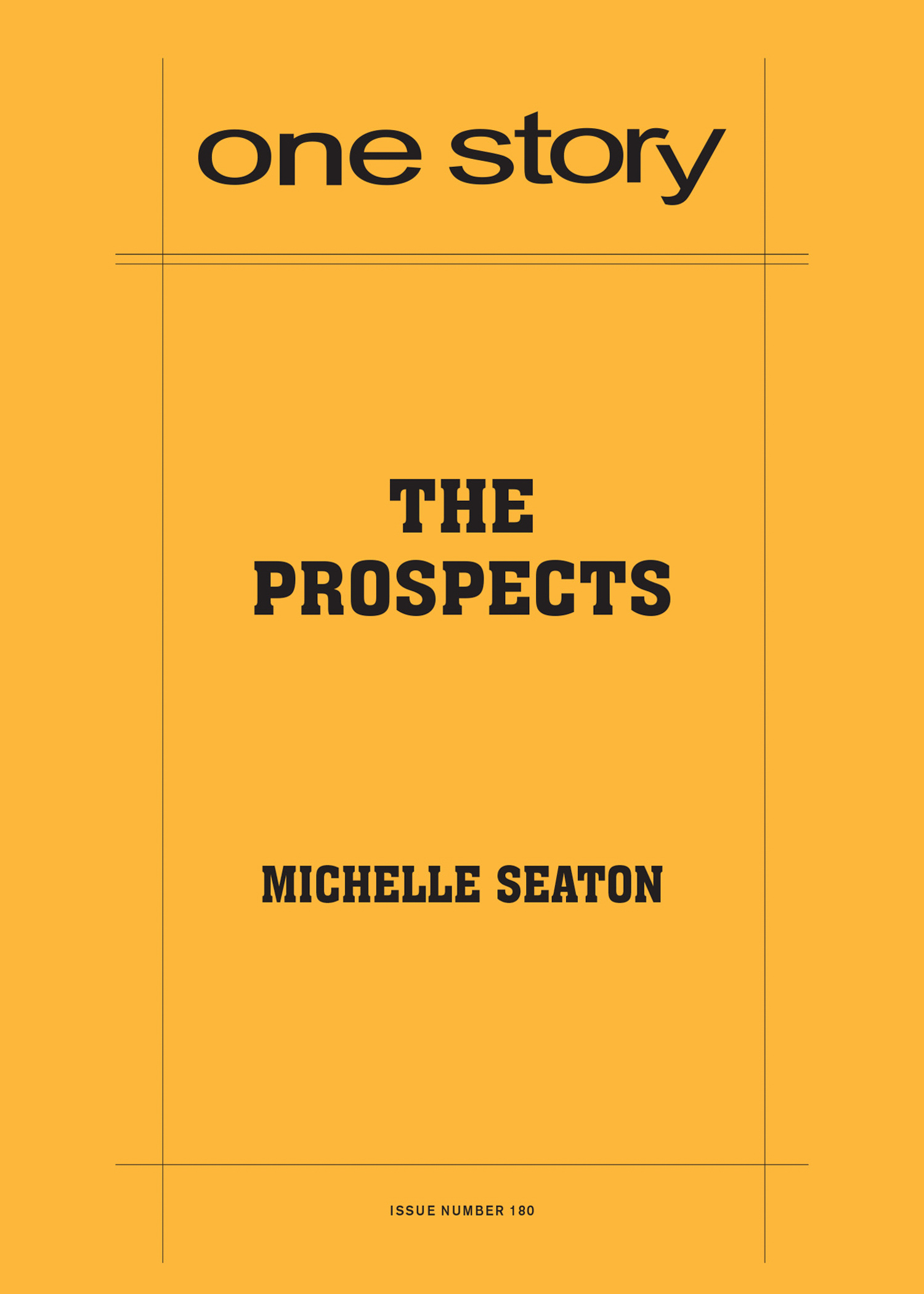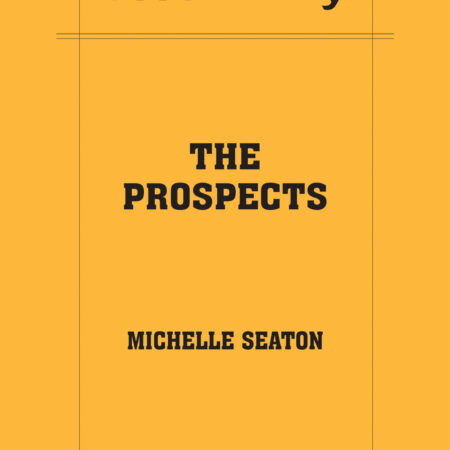
The Prospects
$2.50
43 in stock
Excerpt
Huge and eternally hungry, the prospects carry trays overburdened with food, with mounds of spaghetti trailing off chipped plates, with cheeseburgers and stacks of peanut butter sandwiches, with bagels, crackers, sweaty boxes of milk, with cookies, brownies, ice cream. The prospects are eager to gain. All morning long, through history and English and shop, their bellies have groaned with want, their growing bones have ached. The cafeteria ladies with their hairnets and ample bodies just laugh and shake their heads at the sight of so much food. Every day they ask the same thing: How can you boys eat so much?
In stuffy classrooms and chatter-filled hallways, the prospects move like sloths. They shuffle. They slouch. They doze or turn sleepy gazes to the blackboard, out the window, at the floor. Only at lunchtime do they come alive. Hunched over their trays, baseball caps backward, the prospects tuck in. They eat steadily without pause. The prospects wear low-slung jeans and fat sneakers, and tent-like T-shirts bearing slogans. On Fridays, the prospects wear grass-stained game shirts. Next week is the last week of the football season and already the college coaches are gathering, writing, phoning, texting, sometimes visiting.
Michelle Seaton
Michelle Seaton’s fiction and essays have appeared in Harvard Review, Sycamore Review, The Pinch, Lake Effect and Best American Nonrequired Reading. She has been a longtime contributor to National Public Radio’s “Only a Game,” for which she has reported on everything from college-football recruiting to team precision skating. She teaches writing at Boston University’s College of Communication and creative nonfiction at Grub Street, an independent writing center in Boston.
Q&A by Hannah Tinti
- HT: Where did the idea for this story come from?
- MS: My first exposure to football as a reporter was covering a high school team for a series of NPR stories. I was fascinated by the college coaches who came to the school to recruit players. I shadowed them and watched them stand in a line looking into the cafeteria at the players. Then I did a few stories on college football and heard the other side of it. I met college coaches who bragged that they could judge a kid’s weight and height from across a room. One coach talked about his days as a grad assistant when he was essentially homeless for a few months one winter. The head coach gave him permission to drag a twin mattress into the unused shower area, and that’s where he slept.
- HT: The POV in your story is quite unusual. Why did you choose to write “The Prospects” from an omniscient, group “they” perspective, going back and forth between the Recruiters and the Prospects?
- MS: I liked the idea of linking the players and coaches through the experiences that they have in common. The players are different from each other, but they are linked by their exceptional status as players and by being recruited. They’ve been filled with a certain kind of hope. The coaches are even more alike because they have been shaped by the culture of football and by their experiences as elite college athletes. The coaches are former star athletes, some of them were well-known college players, and they drive around in the middle of winter and meet with kids who possess half their talent, half their drive, and yet the coaches have to make nice and make a sale. A third-person plural narrator is in a position to emphasize how many of these conversations go on every season and how interchangeable they are.
- HT: Most of your experience is as a reporter, writing non-fiction. Is it hard to switch to fiction, especially in this case, where you are so familiar with the territory?
- MS: Yes. Reporting is about observing and collecting details. Creating a nonfiction narrative is finding a frame for what you’ve seen and learned. In the field, I’m taking notes while noting the parts of a story that I need to find, what observations might work in a lead. Fiction is an act of imagination in which the primary work is finding the right container for a story. You have unlimited choices in terms of character traits and events, but you must be careful to make choices that are more powerful and unsettling than what goes on in real life. Also, you have to find the right narrative stance, one that allows you to safely obsess about story material.
- HT: Did you ever find it challenging to be a woman writing about this male-dominated sport?
- MS: I’ve always focused on the advantages of being an outsider when interviewing coaches and players. An outsider has enormous freedom to ask anything. I once asked a high school player why they wear helmets but not pads in two-a-day practices in August. He told me that the helmets are heavy, they hurt your neck, and you need to wear them for a few days to get used to them. A former player would not ask that question. A man who never played might be reluctant to ask something that betrays so much ignorance. As an outsider I’ve also been allowed extraordinary access. I was allowed to walk into sideline huddles and record them. A few times I was allowed to stand between a high school head coach and the assistant who was calling plays. More than that, I was allowed to ask them directly about their feelings and I never had to worry that they would take offense or feel mocked.
- HT: Even though “The Prospects” concerns the football industry, in many ways it could be a metaphor for any profession—teaching, dance, writing, even a metaphor for life—where the young are valued vs. the old. Were you conscious of this, as you were working on the story?
- MS: Absolutely. The despair these coaches feel is the same despair I see among my fellow writers, and among my students. I feel it, too. In the arts particularly, there are so many hopefuls with brand-new graduate degrees and very few successes. I know so many published novelists who struggle to earn a living with a patchwork of jobs. We all start off imagining our great works, and then over time our goals become smaller and smaller while our anxiety grows. Is being a writer a noble calling or is it a deeply arrogant and irresponsible gamble with your financial future? I ask myself that question. I ask it a lot. At some point we don’t fear failure as much as we fear that desire to quit and find a day job.
- HT: The suicide/depression rate of ex-players mentioned in “The Prospects” is quite stunning. Have you done much research into this? And are there any organizations out there to help injured players?
- MS: I’ve had the chance to interview Chris Nowinski, who sustained multiple concussions while playing football at Harvard and while working as a professional wrestler, and who has been very open about his struggle with depression. He helped to found the Center for the Study of Traumatic Encephalopathy at Boston University. When a player dies and his brain gets sent to Boston, that’s where it goes. He has really led the charge to educate athletes and coaches at every level about traumatic brain injury, its symptoms and after-effects, and not just among football players. He’s now working to educate hockey players and active military personnel, who also experience brain injuries. His work has had a profound effect on the way youth coaches and parents view head injuries.
- HT: How long did it take you to complete this story?
- MS: I started it a couple of years ago as an exercise, just toying around with the plural narrator. I had fun with it, describing the coaches and the kids, but it wasn’t really going anywhere. Then the Penn State story broke and I couldn’t stop reading about it, particularly one aspect of the story. In 2001, ten years before the scandal broke, a graduate assistant coach at Penn State witnessed Jerry Sandusky raping a child in the showers, and he didn’t report it to police. And people asked, “What kind of person would fail to report such a crime?” I thought that was perhaps the wrong question. As the story unfolded, it became clear that the only aim of anyone inside the university was to protect the program and to protect its head coach. Mostly, they did it without having a direct threat hanging over their heads. A dictator could only dream of having that kind of power. I began to ask what it is about the system that can so effectively separate a young coach from his compassion. How can it so completely subvert his sense of right and wrong? I found that this story was a way to obsess about that question from a safe distance.
